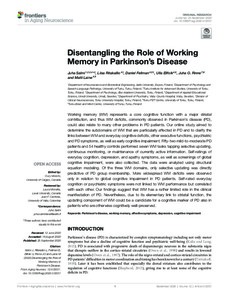Disentangling the Role of Working Memory in Parkinson's Disease
Fellman Daniel; Ellfolk Ulla; Laine Matti; Rinne Juha O; Salmi Juha; Ritakallio Liisa
Disentangling the Role of Working Memory in Parkinson's Disease
Fellman Daniel
Ellfolk Ulla
Laine Matti
Rinne Juha O
Salmi Juha
Ritakallio Liisa
FRONTIERS MEDIA SA
Julkaisun pysyvä osoite on:
https://urn.fi/URN:NBN:fi-fe2021042825590
https://urn.fi/URN:NBN:fi-fe2021042825590
Tiivistelmä
Working memory (WM) represents a core cognitive function with a major striatal contribution, and thus WM deficits, commonly observed in Parkinson's disease (PD), could also relate to many other problems in PD patients. Our online study aimed to determine the subdomains of WM that are particularly affected in PD and to clarify the links between WM and everyday cognitive deficits, other executive functions, psychiatric and PD symptoms, as well as early cognitive impairment. Fifty-two mild-to-moderate PD patients and 54 healthy controls performed seven WM tasks tapping selective updating, continuous monitoring, or maintenance of currently active information. Self-ratings of everyday cognition, depression, and apathy symptoms, as well as screenings of global cognitive impairment, were also collected. The data were analyzed using structural equation modeling. Of the three WM domains, only selective updating was directly predictive of PD group membership. More widespread WM deficits were observed only in relation to global cognitive impairment in PD patients. Self-rated everyday cognition or psychiatric symptoms were not linked to WM performance but correlated with each other. Our findings suggest that WM has a rather limited role in the clinical manifestation of PD. Nevertheless, due to its elementary link to striatal function, the updating component of WM could be a candidate for a cognitive marker of PD also in patients who are otherwise cognitively well-preserved.
Kokoelmat
- Rinnakkaistallenteet [19249]
